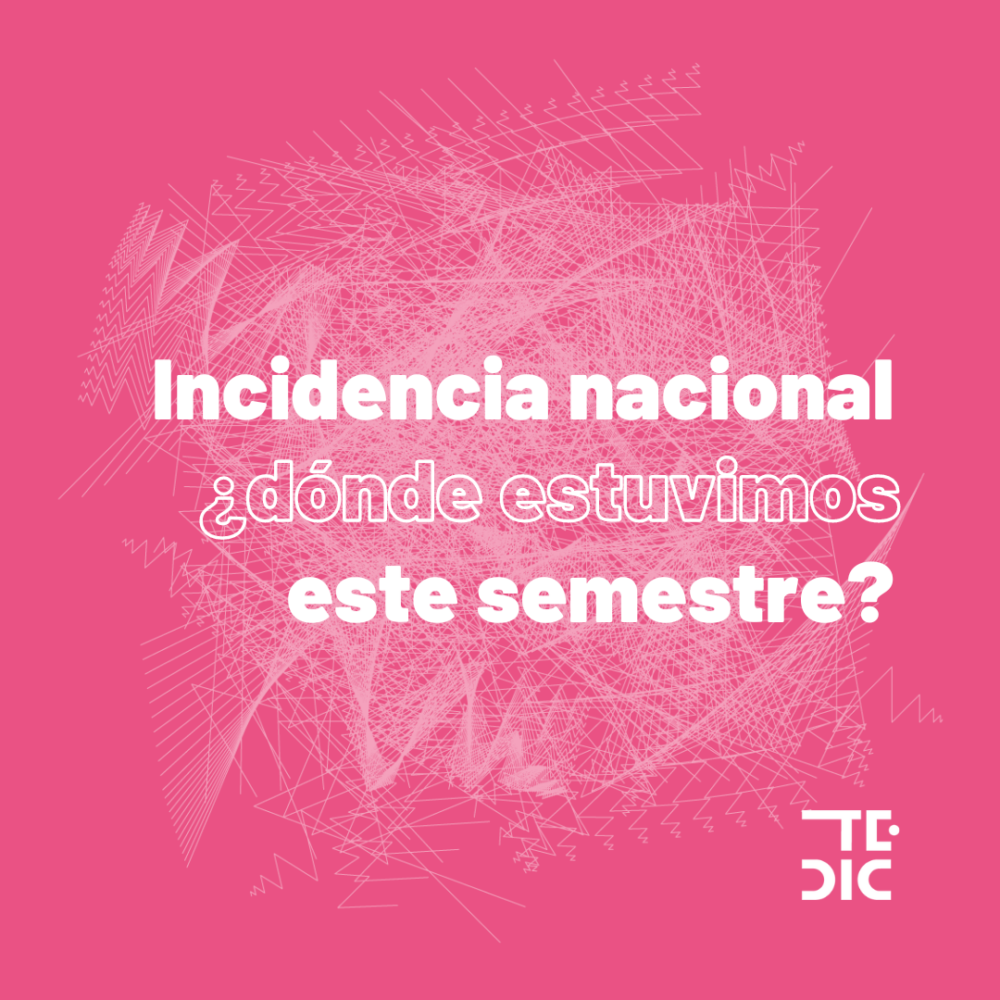
In an increasingly digitalised world and in a national situation that constantly threatens fundamental rights, the protection of our human rights in digital environments becomes an essential task. That is why, as every year, from TEDIC, we carry out a series of actions that seek to have an impact at the national level to ensure due respect for our human rights, following the work done during the first half of this year, in this blog we highlight the main interventions throughout this second half, some achievements, but also challenges, in legislative terms and the activities and meetings held throughout 2023 that sought to renew our commitment and work of more than 10 years in terms of privacy, digital gender violence, personal data, freedom of expression and democracy in Paraguay.
Not with my face: more transparency in the procurement of facial recognition technology
The increasing use of “cyber-surveillance”, particularly through the acquisition of facial recognition cameras, raises concerns about the violation of fundamental rights such as our privacy. Our advocacy actions seek to ensure that the development and implementation of surveillance technologies are in harmony with the respect of our human rights and fundamental freedoms, promoting a more just and transparent society. To this end:
We met with authorities from the Executive Branch and the Ministry of the Interior.
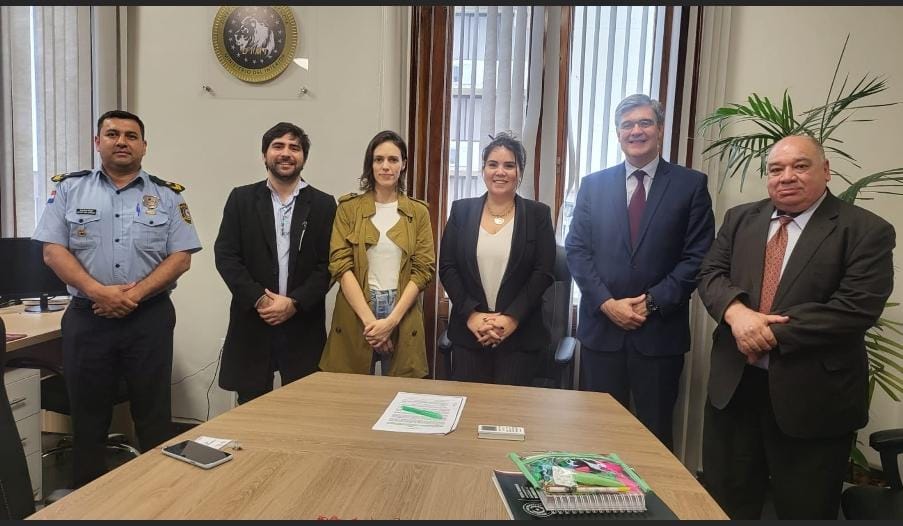
On May 2, a meeting was held with the Vice Minister of Interior, the General Director of the 911 system, legal representatives of the Ministry of Interior and TEDIC. The main focus of the discussion was our concern about the use of facial recognition cameras and the lack of institutional response to these concerns, especially in relation to our request for access to public information, which was denied on “national security” grounds and is currently in litigation before the Supreme Court of Justice. In August, we met with Mr. Nicolás Evers, Planning and Development Manager of the National Telecommunications Commission (CONATEL). In this meeting, we addressed critical issues regarding the distribution and use of institutional funds, highlighting the allocation of these funds for health, education and, recently, security. We also discussed projects such as telecenters and Internet in squares, stressing the importance of renewing and maintaining these initiatives from a human rights perspective and respecting our privacy.
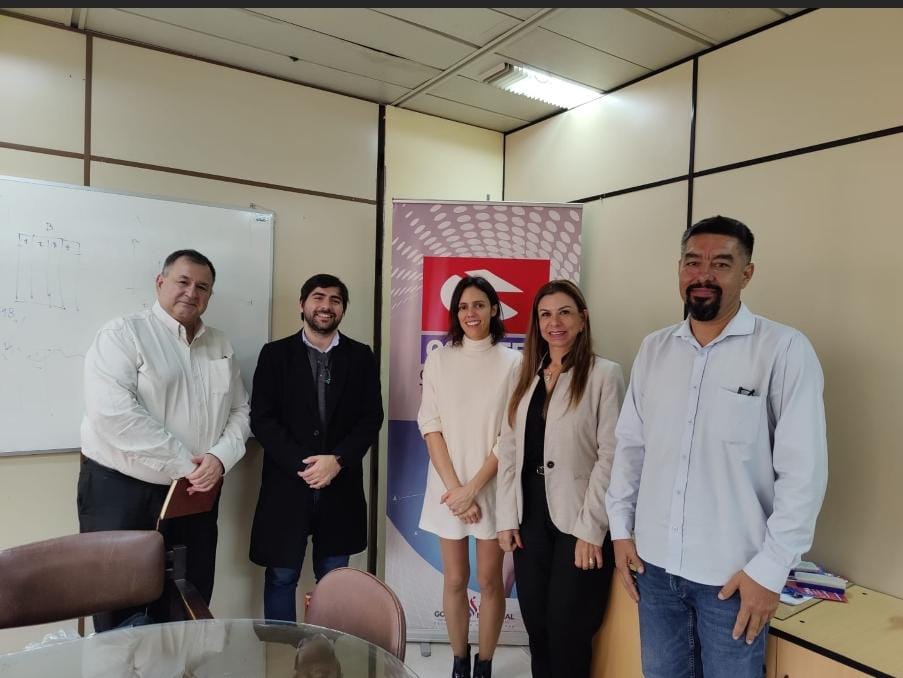
Dialogue with the Judiciary and the Prosecutor’s Office
In April, we held a key meeting between TEDIC together with Minister Ramirez Candia, Nury Montiel, Director of Human Rights of the Supreme Court, and her assistant Janice Goldemberg, where we discussed issues such as biometrics and the legal evolution of our urgency that seeks to resolve the unconstitutionality action filed in September 2019 before the Supreme Court of Justice. This action arose due to repeated denials of access to information on the implementation of facial recognition cameras in the city of Asunción by the Ministry of the Interior and the National Police. In addition, in August, hearings were held with the Minister of the Supreme Court of Justice, Dr. Gustavo Santander, and the Attorney General of the State, Dr. Emiliano Rolón, to discuss transparency in the use of facial recognition technologies and the security of our personal data. At these meetings, we agreed to maintain an open channel of communication to inform the ministers of our progress in this area.
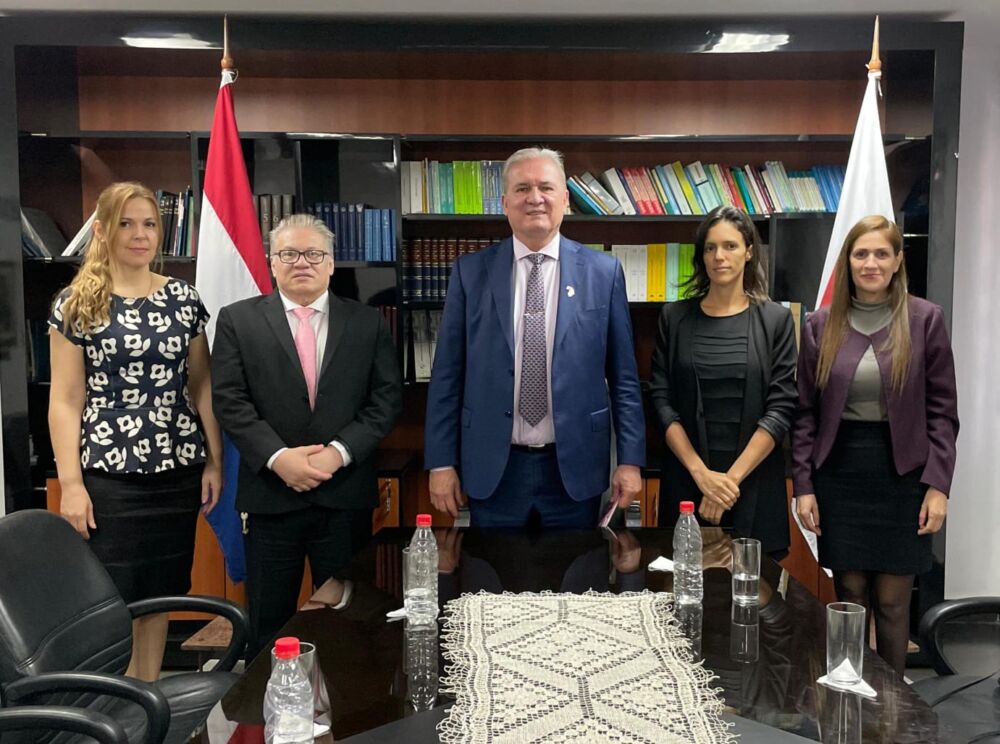
We continue to insist on access to information on the implementation of video surveillance cameras.
Continuing with the legal action initiated in 2019, we submitted two new urgency injunctions to the Supreme Court of Justice to expedite the resolution of an unconstitutionality action related to the implementation of facial recognition technology in video surveillance cameras in Asunción, after receiving denials from the Ministry of the Interior. In addition, we identified new opportunities for strategic legal action, filing injunctions against the National Police and the Ministry of the Interior of Paraguay (Files 2320/2023 and 2319/2023), focusing on transparency and access to public information on the use of facial recognition technologies. These efforts aim to promote discussion on the state’s need for transparency and accountability in the use of these invasive technologies.
My data, my rights: we continue to fight for a comprehensive Personal Data Protection Law.
Legislative Body
Since 2017, from TEDIC, we have been part of the Personal Data Coalition of Paraguay, an interdisciplinary group whose goal has been the enactment of a comprehensive law on personal data that meets international human rights standards and ensures autonomy over our personal data, security and transparency on the collection of the same by companies, organisations and state institutions.
Continuing with the advocacy agenda of the first semester, the work of this second semester was accompanied by the Science and Technology Committee of the Honourable Chamber of Deputies, deputies from other interested committees, the Ministry of Information and Communication Technology (MITIC) and the Legal Counsel of the Presidency of the Republic of Paraguay, allowing the bill to be discussed and edited to have a final version. En el mes de noviembre, el proyecto legislativo volvió a ser incluido en la orden del día de las sesiones de 22 y del 29 de noviembre. In November, the legislative project was again included in the agenda of November 22 and 29 sessions. Unfortunately, it was impossible to address the bill due to the unavailability of the official version discussed between the parties. In addition, on Thursday, December 7, the Legislation Committee, chaired by Dr. Jorge Avalos Mariño, met jointly with members of the Personal Data Coalition and the private sector (entrepreneurs in the technology sector) to receive comments related to legislation in this area. In response to the request of the private sector, the opening of a worktable was proposed to discuss the proposed sanctions and other points that generate controversy in the legislative proposal supposedly for this sector, agreeing to meet again after the legislative fairs and resume it in February or March 2024.
We highlight the predisposition of Congressmen Rodrigo Blanco (PLRA) and Raúl Benítez (PEN) to continue placing the importance of having this personal data protection law on the political and media agenda.
Incidence in national forums and academia
Beyond the incidence in the National Congress, this year we actively participated in significant events such as the IGF Paraguay, where our co-director Eduardo Carrillo presented, together with members of the Personal Data Coalition of Paraguay and the Commission of Science and Technology of the Chamber of Deputies, a panel on the challenges and opportunities of having a comprehensive law on personal data in Paraguay. We also participated in a series of talks at the American University on cybersecurity and cybercrime, focusing on the importance of having legislation that protects us against possible violations of our rights in terms of personal data.
Participation in public and regulatory hearings
Throughout the year, TEDIC was invited to participate in public hearings and discussions on different bills that, although they are aimed at necessary regulations for citizens, represent challenges to the security of our personal data due to a lack of guarantee in their protection from a human rights perspective.
Our opinion on the law on Medical Records in Paraguay
In May, we participated in the public hearing of the Health Commission of the Paraguayan Senate, whose objective was to discuss the bill “That Creates the Electronic Medical Record and the National Registry of Electronic Medical Records”, presented by the deputies Juan Bartolomé Ramirez and Fernando Silva Facetti.
From TEDIC, we express our concerns about this project, recommending its rejection
Our opinion on the traffic data retention law
In June of this year, we participated in another public hearing to discuss the bill “provides for the mandatory retention of traffic data to combat child pornography and related punishable acts“, introduced by Congressman Rodrigo Blanco. This bill, known at the time as the “Pyrawebs” bill, had already been rejected in 2015.
Our participation in this hearing was aimed at making public our concerns about the return of this bill, stressing the importance of prioritising the enactment of a comprehensive legislative proposal for the protection of personal data, which ensures an appropriate balance between the security and privacy of individuals.
The regulation of data retention must be carefully considered, taking into account its implications on fundamental rights, and should not be carried out at the expense of privacy and freedom of expression of individuals.
After the hearing, the bill was presented in the ordinary session of the Chamber of Deputies for its treatment during the session of June 19; Deputy Rodrigo Blanco requested the postponement of the treatment of the same, making a public statement at the session, where he said that his top priority at present is the law on comprehensive protection of personal data, pointing it as the legal cornerstone that will provide the necessary framework to address the legislation on data retention.
Our opinion on the proposed law on universal cyberbullying
The Human Rights Commission of the Senate asked TEDIC for an opinion on the legislative proposal of Senator Zenaida Concepción Delgado Benítez called “To prevent, punish and eradicate universal cyberbullying in Paraguay“, whose objective is “to address cyberbullying effectively and in a universal manner in our country as a consequence of the relevance in our society today in its forms such as cyberbullying, Grooming, Sextortion, gender cyberviolence, sexting, stalking, catfishing, flaming, doxing, revenge porn and others”.
While TEDIC recognises the interest of legislators of the National Congress in thinking of solutions against digital violence, we express our concerns about the possible impact on freedom of expression that could result from the ambiguity in the wording of this bill. This is why we ask for the rejection or substantial modification of the bill so that disproportionate or unjustified restrictions are not imposed, leading to prior or unjustified censorship.
Our opinion on the digital platforms’ law
The bill “Regulating work in digital mobility and home delivery platform companies“, proposed by Congressmen Rodrigo Blanco and Pedro Gómez, arises in response to worrying incidents in the delivery and transportation of people platforms, such as Bolt, MUV, Uber and Pedidos Ya in Paraguay, and seeks to regulate work in them
From TEDIC, as part of the Fairwork network of researchers, we highlight some concerns about the protection of labour rights of workers on digital platforms, underlining the need for a thorough debate before the enactment of this bill, emphasising again the urgency of a comprehensive law on personal data protection in Paraguay, especially in the context of data collection and management on these platforms. Our main proposals include the need for a more detailed focus on anti-discrimination policies and greater transparency in the use of algorithms and automated decisions, thus ensuring a fairer and safer working environment.
Our opinion on the “Electronic anklet law”.
The “Law of electronic anklets” (Law No. 5863), enacted in 2017, seeks to improve the control of persons prosecuted with alternative measures to imprisonment; however, we believe that its regulation in October this year, through Decree No. 466 reveals limitations that could limit its effectiveness in combating gender violence.
From TEDIC, we emphasise the need to improve this regulation, taking into account the implications of the same without a comprehensive law on personal data protection. The rush to adopt technologies without adequate regulation puts our privacy and fundamental rights at risk.
Beyond legislation
Tedic alerted about the leakage of police data in Paraguay
In October of this year, we warned about the massive leak of more than 400GB of confidential data from the Paraguayan National Police, including personal details, police investigation records, biometric data and Civil ID card identifiers. This situation underscores the vulnerability of our personal and biometric data, the lack of transparency protocols of the National Police, and the urgent need for a comprehensive personal data protection law.
We renewed our commitment to work with the Ministry of Information and Communication Technologies (MITIC)
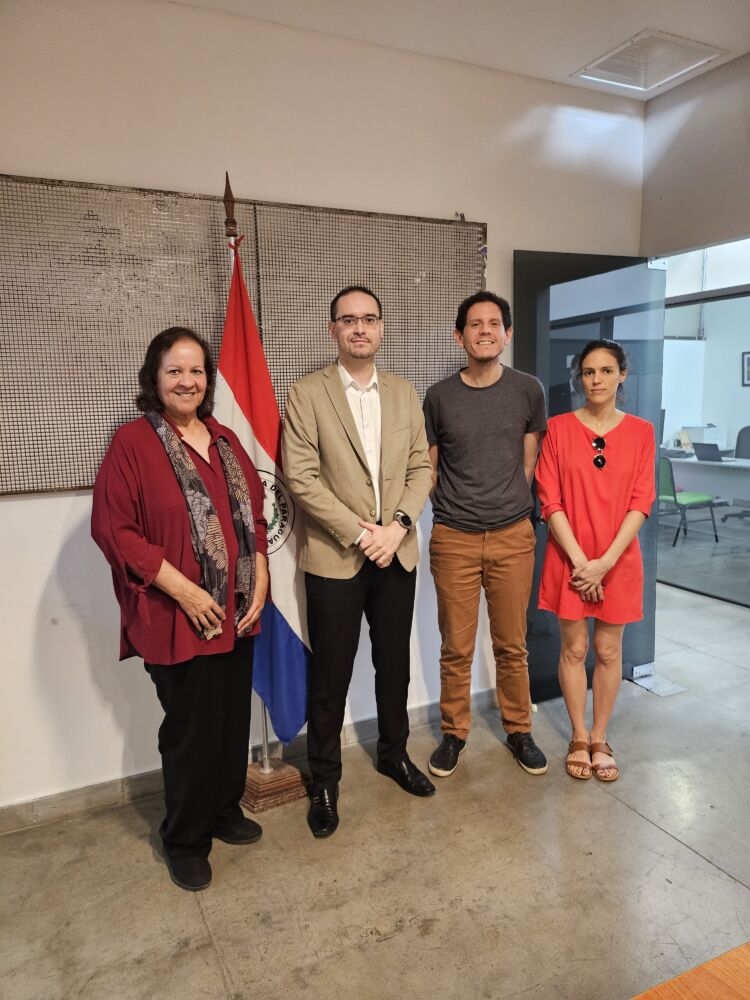
In December of this year, we renewed our commitment to work with the new authorities of the Ministry of Information and Communication Technologies (MITIC); in these meetings, we socialised our agenda for our research and discussed our various impacts in the areas and topics mentioned above in this blog. In addition, we expressed our willingness to participate in future working groups on artificial intelligence issues and explored possible cooperation alliances on issues related to the protempore presidency of Mercosur and the digital agenda.
In addition:
- We presented our research on election misinformation at the Táva Apo Academy to more than 30 community leaders from across the country.
- We participated in the research colloquium on senators elected in the 2023 general elections in Paraguay.
- We presented our research and an exhibition on disinformation in electoral contexts at the Library and Archives of the National Congress (BACCN) with the participation of legislators, representatives of academia and civil society.
- We presented an exhibition on digital dehumanisation and the advancement in the use of autonomous weapons at the Library and Archives of the National Congress (BACCN) with the participation of legislators, diplomatic corps and representatives of the Ministry of Security
We believe that 2023 has been a year of significant progress in the fight for the respect of our human rights in digital environments, through our incidences, legal actions, participation in legislative debates, contributions to raising awareness about the importance of our privacy, the security of our data and protection against digital violence. From TEDIC, we emphasise our commitment to continue collaborating, advising and influencing all these legislative processes, ensuring that any final bill reflects a comprehensive, inclusive and respectful approach to our human rights in the digital environment.

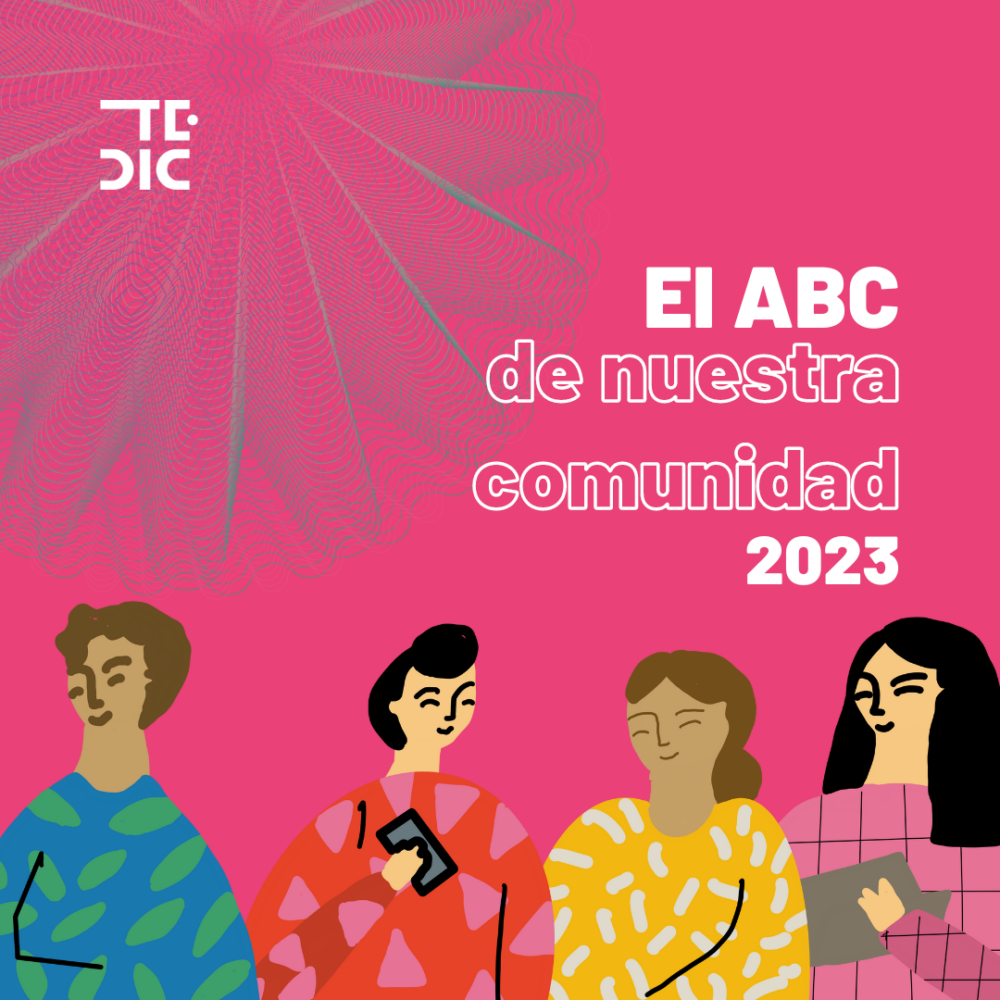 ABC of our community in 2023
ABC of our community in 2023